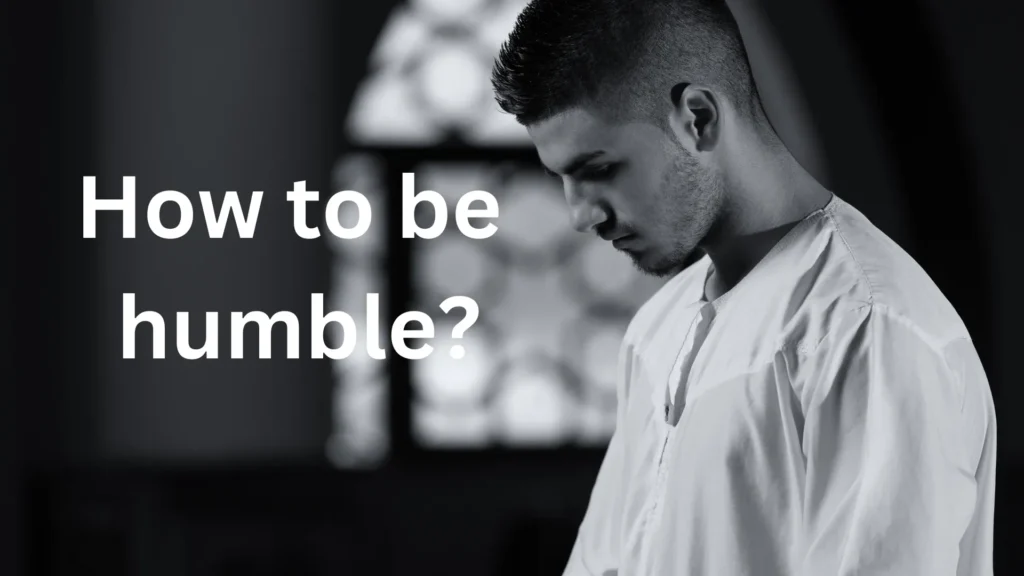
Alright, let’s dive into a fresh take on how to be humble.
Especially through the lens of sports psychology.
We’re keeping it light, easy, and straight to the point.
Let’s go!
What Does It Mean To Be Humble?
Being humble isn’t about selling yourself short.
It’s knowing you’re good but also that you can always be better.
It’s like, “Yeah, I scored the winning goal, but my team set it up perfectly.”
Humble folks recognize their achievements without letting them inflate their egos to blimp size.
Being humble goes beyond just keeping your ego in check.
It’s about valuing others’ success as much as your own.
Imagine you’re part of a relay team and you’re the final runner. You cross the finish line first, but instead of just soaking up the glory, you turn back and high-five every teammate who ran before you.
That’s humility!
It’s also about staying grounded.
Picture this: You’re hitting home runs left and right, but instead of strutting around, you’re there picking up bats after the game or offering to help the new kid with their swing.
Humility means you’re always looking beyond your spotlight, seeing the bigger picture, and recognizing the role others play in your successes.
It involves a constant balance between acknowledging your strengths and being open about your flaws. It’s like saying, “Yeah, I’m good at this, but I’ve still got a ton to learn.”
It’s admitting you don’t have all the answers, which, paradoxically, makes you more approachable and respected.
In essence, being humble is recognizing your achievements without letting them define or limit you.
It’s understanding that every win, every accolade, is just a part of your journey, not the entirety of it.
Humility keeps you hungry, keeps you focused, and most importantly, keeps you human.
Is Being Humble A Good Thing?
Absolutely!
Being humble keeps you grounded and open to learning.
It’s like being that player who, despite being MVP, still picks up cones after practice.
This attitude makes you a magnet for positive vibes and keeps the learning door wide open.
Plus, nobody likes a show-off.
Humility is like the secret sauce that enhances everything it touches.
Think of the greatest athletes out there.
The ones who last, who are loved, and who truly make a difference, aren’t just talented; they’re humble. They know their victories are fleeting moments in a long career, and they stay hungry and humble.
Humility keeps you real. It’s easy to get lost in the hype, to start believing your own press.
But staying humble keeps you connected to what matters: your passion, your teammates, and the pure joy of the game.
It’s that grounding force that prevents success from going to your head and failure from breaking your spirit.
Being humble also opens doors.
Coaches, teammates, fans, and even sponsors are drawn to athletes who show genuine humility.
It makes you a better leader, someone people want to follow and fight for.
Humble athletes are the glue that holds teams together, creating an environment where everyone feels valued and motivated.
Moreover, humility fosters growth.
When you’re humble, you’re always in “learning mode,” open to feedback and eager to improve.
It means you’re resilient, bouncing back from setbacks because you see them as opportunities to grow, not reasons to give up.
In short, humility isn’t just good.
It’s essential. It is what separates the truly great from the merely talented.
It’s what makes you not just a star on the field, but a role model off it.
Humility is strength, cloaked in grace, guiding you to be the best version of yourself.

Being Humble Vs Being Humiliated
Here’s the deal: being humble is a choice.
Being humiliated isn’t.
Humility comes from strength, knowing your worth but not needing to shout it from rooftops.
Humiliation?
That’s feeling shamed or embarrassed.
Big difference!
Choose humility. It’s about power, not defeat.
You see, the line between being humble and feeling humiliated might seem thin, but it’s actually worlds apart.
Humility is a choice, a powerful, intentional stance you take.
It’s about acknowledging your strengths and weaknesses with grace.
Being humiliated, on the other hand, is when you’re made to feel ashamed or disgraced, often by external factors beyond your control.
It’s a blow to your dignity, whereas humility is a sign of it.
Humility is about inner strength.
It’s knowing you’re good but also that you’re a work in progress.
When you’re humble, you own your journey, the ups and downs, without letting them own you.
Humiliation, however, is often tied to failure or embarrassment in a way that feels diminishing, something that’s done to you rather than something you embody.
Being humble means you’re secure enough to show vulnerability, to say, “I messed up” or “I don’t know,” without feeling diminished.
It’s about being confident in your abilities but also open to growth.
Humiliated feelings stem from a place of powerlessness, of being exposed or diminished in the eyes of others.
It’s reactive, often a result of external judgment.
The beauty of humility lies in its capacity to connect, to empathize, and to elevate not just yourself but those around you.
It’s a constructive force, building bridges, fostering teamwork, and nurturing growth.
Humiliation, conversely, is destructive, breaking spirits and eroding self-worth.
In essence, humility is a badge of honor, a testament to your character and strength. It’s actively choosing to place yourself in a position of openness and growth, regardless of your achievements.
Humiliation is an unwelcome imposition, a challenge to your self-esteem and dignity.
While humility can be a path to self-improvement and deeper connections, humiliation often requires healing and resilience to overcome.
How Can Humility Help You Win The Game?
Humility is your secret weapon!
It makes you coachable, a team player, and insanely resilient.
Think of it as your mental agility drill. It helps you bounce back from losses faster because you’re focused on learning, not just winning.
Long story short, humility can actually get you more wins.
Humility is like the unsung hero behind many great victories. It might not grab the headlines, but it’s often what makes winning possible in the first place.
Here’s how:
- Enhances Teamwork:
Humility puts the team’s goals above personal glory.
When you’re humble, you’re more likely to pass the ball, celebrate a teammate’s success, and work towards the common good.
This creates a stronger, united team that’s hard to beat.
- Keeps You Grounded:
Success can be as destabilizing as failure if not handled correctly.
Humility keeps you grounded after a big win, ensuring you don’t get complacent.
It reminds you that every game is a new game, keeping you hungry and focused.
- Improves Coachability:
Humble athletes are coachable athletes.
They’re open to feedback, willing to work on their weaknesses, and always looking to improve.
Coaches love this!
It makes you a valuable player and often earns you more playing time or key roles in crucial moments.
- Increases Resilience:
Humility helps you handle losses and setbacks with grace.
Instead of dwelling on a defeat, a humble athlete looks for lessons.
This resilience means you’re less likely to be psychologically knocked out by a loss, ready to bounce back faster and stronger.
- Attracts Positive Attention:
People naturally root for the underdog, the humble hero who doesn’t need to boast about their skills.
This positive attention can boost team morale, win fan support, and even influence referees and officials subconsciously.
In tight games, this positive vibe can give you an edge.
- Fosters Lifelong Learning:
Humility means you’re always in “student mode,” eager to learn from anyone and any situation.
This attitude keeps your skills sharp and your strategies fresh, making you a formidable opponent who’s always evolving.
Humility, in essence, can be your stealth strategy.
It builds the kind of character and team dynamic that breeds success.
While the cocky player might get the spotlight, the humble player gets the win. It’s about playing smarter, not louder. Growing constantly, not peaking early.
In the long game, humility is not just helpful.
It’s essential!

Steps How To Be Humble
- Listen More: Your coaches, teammates, even opponents, have valuable insights. Listen up.
- Self-Reflect: Post-game, ask yourself what went well and what didn’t. Be brutally honest.
- Celebrate Others: Your teammate scored? Celebrate like you did. It’s not all about you.
- Stay Teachable: No matter how good you get, act like a rookie hungry to learn.
- Give Back: Coach kids, help peers. Sharing knowledge is humility in action.
Examples Of How To Be Humble
After scoring, point to the teammate who assisted.
It’s a team sport, remember?
In interviews, talk about what you’re working on improving, not just what you’re good at.
When you lose, congratulate the winners sincerely. Learn from them.
Volunteer for the less glamorous tasks, like equipment duty or helping to clean up.
In sports, as in life, humility isn’t about downplaying your talents. It’s about acknowledging them without letting your ego take the driver’s seat.
It’s recognizing that every win, every loss, is a step on the path to being not just a better athlete, but a better person.
Keep these insights in your playbook, and you’re not just winning games; you’re winning at growth.
Own up when you mess up. It’s okay to be imperfect. This not only shows humility but also courage.
Sharing what you learned from these slip-ups helps others too.
Regularly ask coaches, teammates, even opponents, for feedback. Show genuine interest in what they say, and use it to improve. It’s a humble way to acknowledge you don’t have all the answers.
Shine the spotlight on your team’s achievements, not just your own. Make it a point to highlight the contributions of others, especially those that might go unnoticed.
No matter how skilled you become, maintain the mindset that there’s always room to grow. Seek out new challenges and learning opportunities actively.
Recognize and appreciate the support system around you, from family and friends to coaches and teammates. A simple thank you can go a long way in showing humility.
Be the first to volunteer, whether it’s for community service, helping a teammate with extra practice, or supporting a charity event. Giving back is a powerful act of humility.
Use inclusive language that acknowledges the team. Instead of saying “I won the game,” try “We won the game.” It’s a small shift with a big impact on how you perceive your role in success.
Spend a few minutes each day reflecting on your actions, attitudes, and improvements. This can help you stay grounded and focused on your journey towards humility.
It’s tempting to post about every win or achievement, but practice restraint. Share milestones, but balance it with stories of struggle and gratitude for those who helped you along the way.
Whether you’re learning from a mentor or mentoring someone else, the exchange of knowledge and experiences is a humbling reminder of the cycle of growth and learning in sports and life.
These steps aren’t just actions but markers on a path to becoming a more humble, respected, and ultimately successful individual in sports and beyond!
Conclusion
In conclusion, embracing humility is not just a personal journey but a powerful catalyst for growth and achievement, particularly in the realm of sports psychology.
Through my work as a sports psychologist, I’ve had the privilege of guiding numerous individuals on their path to realizing their full potential.
The Success Stories Community embodies this journey, offering a unique blend of personal guidance, community support, and an abundance of resources tailored towards fostering high performance.
It’s a space where the values of humility and perseverance are not just encouraged but lived daily.
The stories of transformation within our community serve as a testament to the profound impact of humility in unlocking one’s true capabilities.
By joining the Success Stories Community, individuals gain access not only to personalized advice from a seasoned sports psychologist but also to a network of like-minded peers who share the same commitment to excellence and growth.
This synergy of professional support and communal encouragement creates an environment ripe for breakthroughs and unparalleled achievement.
As we continue to build on these successes, it becomes clear that humility is more than a virtue—it’s a strategy.
A strategy that enables individuals to remain open to learning, resilient in the face of challenges, and deeply connected to others on a similar journey.
In the Success Stories Community, we witness the power of humility to transform potential into peak performance, proving that when we lower our ego, our potential soars.
Let’s embrace this journey together, supporting one another in our quest to achieve and exceed our highest aspiration!
See you on the inside!



